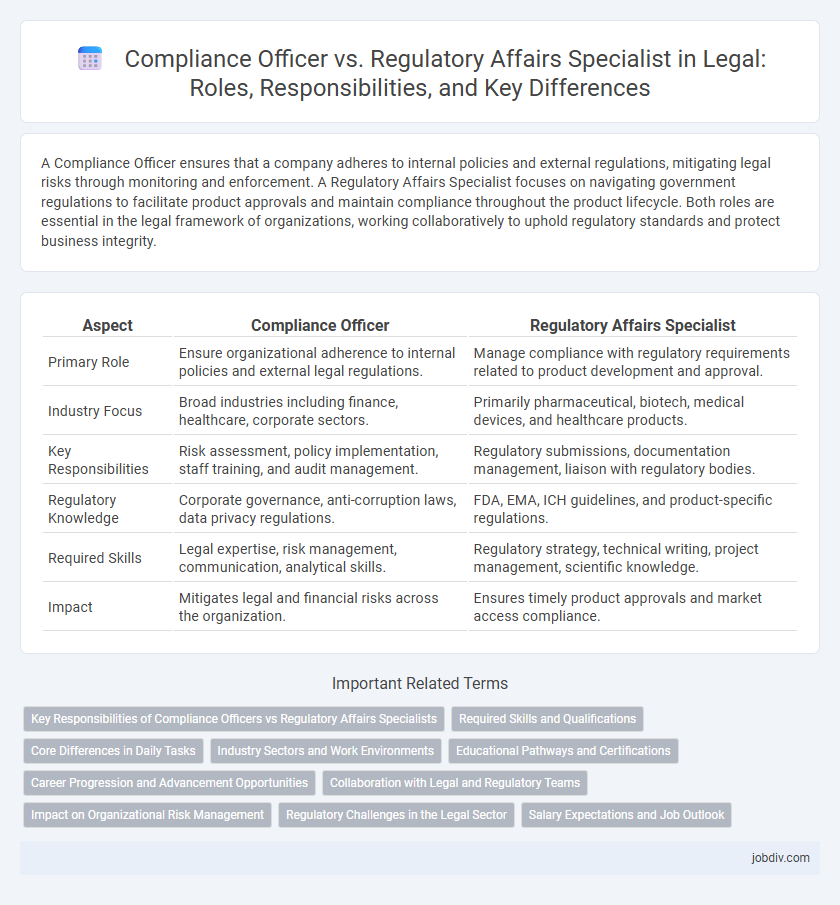A Compliance Officer ensures that a company adheres to internal policies and external regulations, mitigating legal risks through monitoring and enforcement. A Regulatory Affairs Specialist focuses on navigating government regulations to facilitate product approvals and maintain compliance throughout the product lifecycle. Both roles are essential in the legal framework of organizations, working collaboratively to uphold regulatory standards and protect business integrity.
Table of Comparison
| Aspect | Compliance Officer | Regulatory Affairs Specialist |
|---|---|---|
| Primary Role | Ensure organizational adherence to internal policies and external legal regulations. | Manage compliance with regulatory requirements related to product development and approval. |
| Industry Focus | Broad industries including finance, healthcare, corporate sectors. | Primarily pharmaceutical, biotech, medical devices, and healthcare products. |
| Key Responsibilities | Risk assessment, policy implementation, staff training, and audit management. | Regulatory submissions, documentation management, liaison with regulatory bodies. |
| Regulatory Knowledge | Corporate governance, anti-corruption laws, data privacy regulations. | FDA, EMA, ICH guidelines, and product-specific regulations. |
| Required Skills | Legal expertise, risk management, communication, analytical skills. | Regulatory strategy, technical writing, project management, scientific knowledge. |
| Impact | Mitigates legal and financial risks across the organization. | Ensures timely product approvals and market access compliance. |
Key Responsibilities of Compliance Officers vs Regulatory Affairs Specialists
Compliance Officers ensure organizational adherence to internal policies and external legal regulations by conducting audits, risk assessments, and training programs. Regulatory Affairs Specialists focus on the preparation and submission of regulatory documents, maintaining compliance with industry-specific laws, and liaising with regulatory agencies to secure product approvals. Both roles are critical in mitigating compliance risks but differ in their emphasis on internal oversight versus external regulatory communication.
Required Skills and Qualifications
Compliance Officers require expertise in risk management, internal audits, and regulatory frameworks such as Sarbanes-Oxley and GDPR, complemented by strong analytical and communication skills. Regulatory Affairs Specialists must have detailed knowledge of industry-specific regulations, product lifecycle documentation, and submission processes, often supported by certifications like RAC or a scientific background in life sciences. Both roles demand proficiency in interpreting complex legal texts, ensuring organizational adherence to laws, and maintaining up-to-date knowledge of evolving regulatory requirements.
Core Differences in Daily Tasks
Compliance Officers primarily ensure that organizations adhere to internal policies and legal standards by conducting audits, monitoring operations, and implementing training programs to prevent violations. Regulatory Affairs Specialists focus on managing submissions and communications with regulatory agencies, preparing documentation for product approvals, and staying updated on changing laws to facilitate market entry. While Compliance Officers monitor overall adherence and risk management, Regulatory Affairs Specialists concentrate on regulatory strategy and product-specific compliance throughout the lifecycle.
Industry Sectors and Work Environments
Compliance Officers primarily operate within financial services, healthcare, and manufacturing industries, ensuring organizational adherence to internal policies and external legal requirements. Regulatory Affairs Specialists concentrate on pharmaceutical, biotechnology, and medical device sectors, focusing on obtaining and maintaining product approvals from regulatory agencies. Both roles commonly work in corporate offices, government agencies, and consulting firms where regulatory frameworks are critical to operational success.
Educational Pathways and Certifications
Compliance Officers typically pursue degrees in law, business administration, or finance, often obtaining certifications such as Certified Compliance & Ethics Professional (CCEP) to demonstrate expertise. Regulatory Affairs Specialists commonly hold degrees in life sciences, pharmacy, or engineering, with certifications like the Regulatory Affairs Certification (RAC) enhancing their qualifications. Both roles require continuous education to stay current with evolving laws and regulatory standards across industries.
Career Progression and Advancement Opportunities
Compliance Officers typically advance by gaining expertise in risk management and corporate governance, often moving into senior compliance or chief compliance officer roles. Regulatory Affairs Specialists progress through mastering regulatory submissions and product approvals, leading to positions like regulatory affairs manager or director. Both career paths emphasize specialized knowledge and certifications, with advancement driven by experience in navigating complex legal and regulatory landscapes.
Collaboration with Legal and Regulatory Teams
Compliance Officers closely collaborate with legal teams to ensure organizational practices align with current laws and internal policies, facilitating risk mitigation and adherence to regulatory requirements. Regulatory Affairs Specialists work alongside regulatory teams to interpret and implement complex regulations, preparing submissions and maintaining communication with authorities to secure product approvals. Effective collaboration between these roles streamlines compliance processes, enhances regulatory intelligence, and supports a unified approach to legal and regulatory challenges.
Impact on Organizational Risk Management
Compliance Officers play a critical role in organizational risk management by developing and enforcing internal policies that ensure adherence to legal standards and prevent regulatory breaches. Regulatory Affairs Specialists focus on navigating external regulatory landscapes, ensuring products and operations meet governmental requirements to avoid sanctions and market access issues. Together, their collaboration minimizes legal risks and enhances the organization's ability to maintain compliance in complex regulatory environments.
Regulatory Challenges in the Legal Sector
Compliance Officers navigate complex legal frameworks to ensure organizations adhere to laws, mitigate risks, and implement internal policies effectively. Regulatory Affairs Specialists concentrate on interpreting and managing external regulations, liaising with regulatory bodies to facilitate product approvals and maintain compliance standards. Both roles confront evolving regulatory challenges, including adapting to jurisdictional variances, responding to legal reforms, and addressing enforcement pressures within highly regulated industries.
Salary Expectations and Job Outlook
Compliance Officers earn a median annual salary of approximately $75,000, with expectations to grow by 5% over the next decade, driven by increasing regulatory requirements across industries. Regulatory Affairs Specialists typically command salaries around $80,000, benefiting from steady demand in healthcare, pharmaceuticals, and biotech sectors, with job growth projected at 6%. Both roles emphasize risk management and adherence to laws, but Regulatory Affairs Specialists often require specialized knowledge of industry-specific regulations, impacting salary and employment opportunities.
Compliance Officer vs Regulatory Affairs Specialist Infographic

 jobdiv.com
jobdiv.com